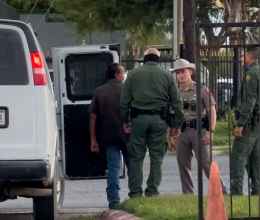
Immigration and immigrants’ rights are hot button topics for civil rights supporters in Texas, but during the 86th Texas Legislature, our elected officials reviewed a lot of policy yet did very little on the issues.
The biggest immigration-related issue of the session revolved around the state budget, which contained $800 million for “border security,” almost all of which was earmarked for the Department of Public Safety’s (DPS) use. This is despite the fact that the state has provided little to no information about how the money would actually be spent let alone how exactly it would improve border security. However, lawmakers did include guidance to DPS on how the department should report their work along the border to the legislature.
Beyond funding matters, the legislative session saw a balance of advocacy around pro-immigrant laws as well as actions to stop anti-immigrant legislation. In the end, all efforts hit a wall: very few positive or negative immigrants’ rights bills passed. But considering the anti-immigrant legislation of recent years — especially the passage of the so-called anti-sanctuary city law Senate Bill 4 — no news can be considered good news.
Here’s a look at what the ACLU of Texas fought for and against this session, with the help of our supporters and fellow advocates:
Stopping the Border Wall
Late in the session, attempts were made to use $100 million in federal funds to build sections of border wall, using the state budget as a pass-through. The last-minute trick didn’t work, as advocates led the fight to have it removed. Additionally, legislation to give new funding to the Governor for border projects almost became another vehicle to build parts of a border wall. House Bill 4306 fortunately never made it out of Senate committee.
Preventing Reckless Border Enforcement
Two bills that would have enacted reckless border enforcement polices were stopped this session. The first, Senate Bill 1205, proposed the eradication of a variety of weed along the border. Undocumented immigrants allegedly cross the border where these weeds grow tall. Fortunately, residents and advocates spoke out against the poisoning of waterways as a result of using herbicides to kill the weeds, and the bill died during the session.
Another bill, Senate Bill 2127, would have allowed local law enforcement volunteers to join the Department of Public Safety (DPS) to patrol the Rio Grande Valley. Even worse, the bill had language to ensure that DPS would not be held responsible for civil rights violations these volunteers commit. Though the bill passed in the Senate, it died in the Texas House.
Addressing Racial Profiling
The House State Affairs Committee heard several bills designed to address issues created by Senate Bill 4, a 2017 state law that forces local governments and law enforcement agencies to do the work of federal immigration officers. Several bills aimed to repeal SB 4 completely, while other bills addressed issues that exist on university campuses and domestic violence shelters as a result of the law. The committee also considered House Bill 35, which would have expanded access to driver’s licenses for people with immigrant visas. Although none of these bills passed, ACLU of Texas volunteers and staff, along with our allies in the immigrants’ rights movement, made a statement about the need for reform through our collaborative work.
After a 2017 legislation session filled with anti-immigrant rhetoric, the 2019 Texas Legislature took a big step back from its anti-immigrant actions. Thanks to the advocacy and efforts of the ACLU of Texas supporters, it seems there is reason to hope that the attack on immigrants’ rights in Texas may be on the decline — at least for now.






